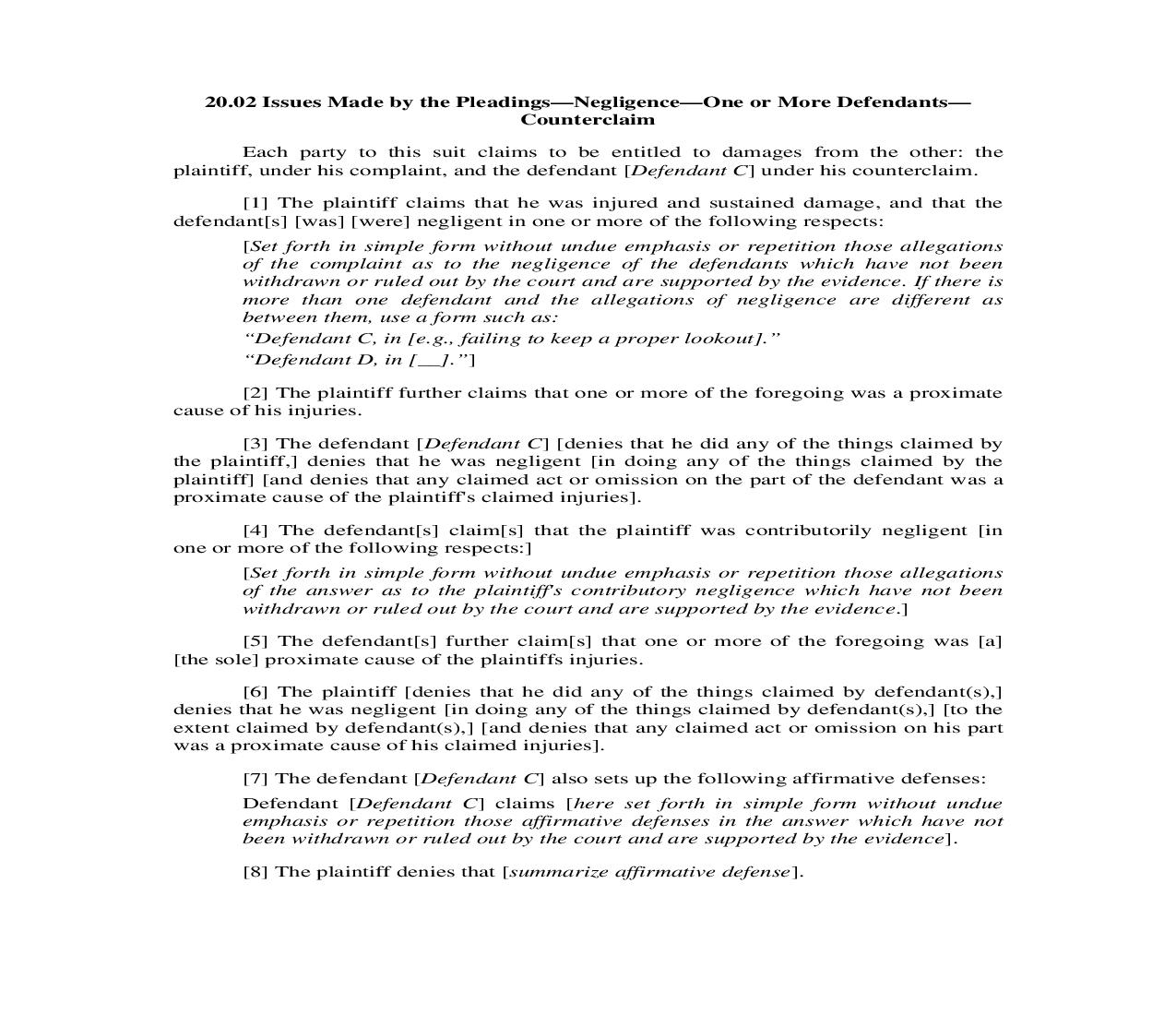
Last updated: 4/13/2015
20.02. Issues Made by the Pleadings-Negligence-One Or More Defendants-Counterclaim
Start Your Free Trial $ 11.99What you get:
- Instant access to fillable Microsoft Word or PDF forms.
- Minimize the risk of using outdated forms and eliminate rejected fillings.
- Largest forms database in the USA with more than 80,000 federal, state and agency forms.
- Download, edit, auto-fill multiple forms at once in MS Word using our Forms Workflow Ribbon
- Trusted by 1,000s of Attorneys and Legal Professionals
Description
20.02 Issues Made by the Pleadings--Negligence--One or More Defendants-- Counterclaim Each party to this suit claims to be entitled to damages from the other: the plaintiff, under his complaint, and the defendant [Defendant C] under his counterclaim. [1] The plaintiff claims that he was injured and sustained damage, and that the defendant[s] [was] [were] negligent in one or more of the following respects: [Set forth in simple form without undue emphasis or repetition those allegations of the complaint as to the negligence of the defendants which have not been withdrawn or ruled out by the court and are supported by the evidence. If there is more than one defendant and the allegations of negligence are different as between them, use a form such as: "Defendant C, in [e.g., failing to keep a proper lookout]." "Defendant D, in [__]."] [2] The plaintiff further claims that one or more of the foregoing was a proximate cause of his injuries. [3] The defendant [Defendant C] [denies that he did any of the things claimed by the plaintiff,] denies that he was negligent [in doing any of the things claimed by the plaintiff] [and denies that any claimed act or omission on the part of the defendant was a proximate cause of the plaintiff's claimed injuries]. [4] The defendant[s] claim[s] that the plaintiff was contributorily negligent [in one or more of the following respects:] [Set forth in simple form without undue emphasis or repetition those allegations of the answer as to the plaintiff's contributory negligence which have not been withdrawn or ruled out by the court and are supported by the evidence.] [5] The defendant[s] further claim[s] that one or more of the foregoing was [a] [the sole] proximate cause of the plaintiffs injuries. [6] The plaintiff [denies that he did any of the things claimed by defendant(s),] denies that he was negligent [in doing any of the things claimed by defendant(s),] [to the extent claimed by defendant(s),] [and denies that any claimed act or omission on his part was a proximate cause of his claimed injuries]. [7] The defendant [Defendant C] also sets up the following affirmative defenses: Defendant [Defendant C] claims [here set forth in simple form without undue emphasis or repetition those affirmative defenses in the answer which have not been withdrawn or ruled out by the court and are supported by the evidence]. [8] The plaintiff denies that [summarize affirmative defense]. [9] The defendant[s] further denies [deny] that the plaintiff was injured or sustained damages [to the extent claimed]. [10] The defendant [Defendant C] counterclaims that he was injured and sustained damage, [and that the plaintiff was negligent in one or more of the ways previously mentioned] [and that [Defendant D] was negligent in one or more of the following ways]: [Set forth in simple form without undue emphasis or repetition those allegations of the counterclaim against [Defendant D] which have not been withdrawn or ruled out by the court and are supported by the evidence.] [11] The plaintiff [denies] [and [Defendant D] each deny] [that he [they] did any of the things claimed in the counterclaim] [that he was [they were] negligent] [in doing or omitting to do any of the things claimed in the counterclaim,] [to the extent claimed] [and] claims that [defendant's] [Defendant C's] injury or damage was proximately caused [solely] by the negligence of [defendant] [Defendant C]. [12] The plaintiff claims that defendant [Defendant C] was contributorily negligent [in one or more of the following respects:] [Set forth in simple form without undue emphasis or repetition those allegations of the answer as to defendant's contributory negligence which have not been withdrawn or ruled out by the court and are supported by the evidence.]. [13] The plaintiff further claims that one or more of the foregoing was [a] [the sole] proximate cause of defendant's [Defendant C's] injuries. [14] The defendant [Defendant C] [denies that he did any of the things claimed by the plaintiff,] denies that he was negligent [in doing any of the things claimed by the plaintiff,] [to the extent claimed by the plaintiff,] [and denies that any claimed act or omission on his part was a proximate cause of his claimed injuries]. [15] [[The plaintiff] [and] [Defendant D] further set(s) up the following affirmative defense(s): The plaintiff [and] [Defendant D] claim(s) [summarize in simple form and without undue emphasis or repetition any affirmative defenses alleged in the answer to the counterclaim that are supported by the evidence].] [16] [The defendant(s) [Defendant C] [denies] [deny] that [summarize affirmative defense].] [17] The plaintiff [denies] [and [Defendant D] each deny] that [Defendant C] was injured or sustained damages [to the extent claimed].







